Pariyatti Books Expanded During the Pandemic
Written by: Renate Moerman
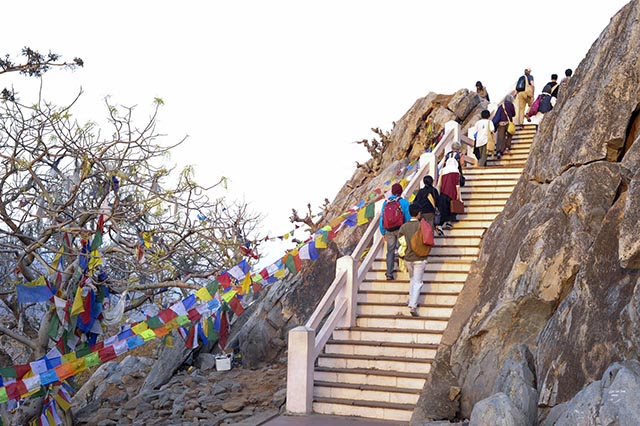
Pariyatti’s efforts to respond to the growing pandemic started when a pilgrim felt dizzy climbing Vulture Peak, shown. Luckily, she didn’t have COVID-19.
Photos courtesy of Pariyatti
For Pariyatti the COVID-19 era began with a 5 a.m. distress phone call. It was January 27, and 16 pilgrims were one week into their three-week pilgrimage through India and Nepal.
Calling from India, the Pariyatti team member said one of the pilgrims had become dizzy while climbing to Vulture’s Peak, one of the Buddha’s favorite places to meditate. She said, “Could it be the novel coronavirus?”
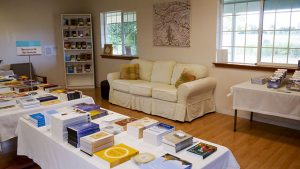
Visitors are welcome to relax and read at Paryiatti Books with cozy couches, tea, and plenty of Dhamma books!
Washington-based Pariyatti, the nation’s largest distributor of Theravada books and materials, organizes several pilgrimages each year for vipassana meditators in the tradition of S.N. Goenka. This journey catered specifically to Chinese-speaking participants.
Luckily the pilgrim’s dizziness turned out to be just over-exertion. We did, however, set our emergency protocols in motion. Our complete pilgrimage team and various board members started closely following the World Health Organization and other information sources, and implementing procedures to keep the pilgrims safe. Our aim was to help them finish their journey as undisturbed as possible.

Pariyatti’s bookstore and warehouse are in Onalaska, Washington, close to the Northwest Vipassana Center.
Pariyatti pilgrimages are often likened to “mobile meditation retreats.” Participants meditate two to seven hours a day, and where possible the hour-long group sittings are held at historical sites related to the life and teaching of the Buddha. This creates an atmosphere supporting deep meditation.
Such opportunities are hard for people with family and work responsibilities to find. We wanted to do our utmost to prevent ending the journey prematurely.
At that time coronavirus was not yet a global pandemic, but as the days passed countries started tightening and sealing their entry points, especially for Chinese travelers. We were unsure we’d be able to re-enter India after visiting Lumbini in Nepal—the birthplace of Buddha—so we cancelled that part of the itinerary to avoid difficulties at the border.
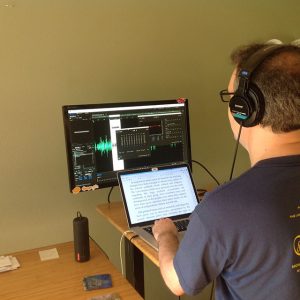
Publisher Steve Hanlon evaluates a volunteer’s voice recording, to see if adjustments are needed.
With years of experience and well-established contacts on the ground, our guide managed to reschedule the remainder of the pilgrimage, including shifting accommodation bookings at various monasteries and guest houses. By the time the journey reached its end most flights to and from China had been cancelled. We approached the Chinese consulate and foreign ministry, and in the end all pilgrims returned home in the smoothest possible way.
Pariyatti exists to bring people into contact with the teachings of the Buddha, and facilitating pilgrimages is only one aspect of our work. The Pāli word “pariyatti” refers to the theoretical learning of the teachings of the Buddha. It is contrasted with “patipatti,” which means to put the theory into practice (meditation).
At Pariyatti we have sold and published dhamma books for more than three decades. Pariyatti started distributing mail-order vipassana books and tapes from a garage in California in the mid-1980s, gradually expanding to offer a wide range of resources in the Theravada tradition. Pariyatti is the American distributor of Pali Text Society titles, and also imports and republishes titles by the Buddhist Publication Society of Sri Lanka in high-quality print, all specifically for the Western market.

Worldwide shipments of physical books have continued during the virus.
Our bookstore and warehouse facility is situated on a quiet country road in Onalaska, Washington, with views of Mt. St. Helens and Mt. Rainier. The primary reason we chose this location is that it’s only two miles away from the Northwest Vipassana Center, Dhamma Kuñja.
Usually our retail store is open on mornings that meditation courses end, and on weekdays by appointment. Of course during the pandemic we have closed the store to the public. Our shipping of orders worldwide—which come in via our Pariyatti website—have continued as usual because only one person at a time works in the warehouse, already in line with Washington state pandemic restrictions.
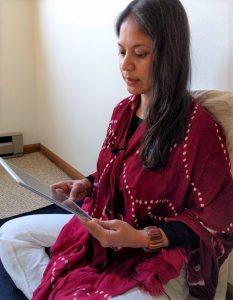
Volunteer audiobook reader Sophia Ojha in action.
Most of our small team already works remotely, so Pariyatti’s activities never ceased. Empathizing with people around the world confined to their homes and surrounded by fear and uncertainty, we started creating new resources to inspire meditators and scholars and to help them make best use of the extra time on their hands.
In times like these it is essential to keep practicing Dhamma and cultivating one’s meditation practice. These help people respond to challenges in a balanced way with wisdom (paññā), compassion (karuṇā), equanimity (upekkhā), and selfless love (mettā).
Our Dhamma brother Kory Goldberg, co-author of the travel guide “Along the Path,” wrote a piece entitled “Dhamma Practice in the Face of the Coronavirus,” which we featured on the website and in our newsletter. Goldberg writes his efforts to prevent spreading the virus made him increasingly aware how touching the face is a deep-seated, unconscious habit.
“So right now, as I feel an itch on my left eyebrow, I do not immediately scratch it, but observe the sensation and understand its characteristic of anicca (impermanence),” he wrote. “Experiencing the itch fully, and noticing my aversion to the unpleasant, yet impermanent sensations, is not only an opportunity to cultivate wisdom, but also a moment to protect myself in the era of COVID-19, and perhaps deadlier future viruses.”
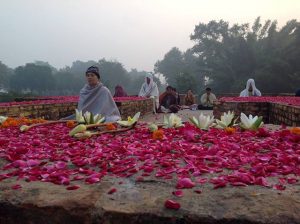
Pariyatti pilgrims meditate at the site of the Buddha’s hut at Jetavana Monastery.
In April Pariyatti launched Dhamma Story Time, a weekly series of 30-minute online reading sessions, scheduled on different days and times each week to cater to different time zones. Volunteer readers choose texts from our catalog they find inspiring, keeping in mind that the readings need to be suitable for meditators in our tradition, for Theravada scholars, and for listeners with little or no prior knowledge of the Dhamma.
Death has an important place in the teachings of the Buddha, and our late teacher S.N. Goenka wrote a wonderful article called “What Happens at Death?” Although such a text inspires many meditators, in light of the pandemic and its high death toll we decided to stick with more uplifting stories from the Dhammapada, about the disciples of the Buddha, and on social and communal harmony.
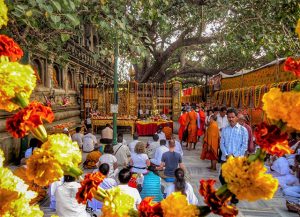
Pilgrims meditate at the Mahabodhi Temple in Bodhgaya, where the Buddha attained enlightenment.
Bringing out extra audiobooks was another activity we focused on, as we learned how much people appreciate these. Some of our regular volunteer narrators wanted to record more titles while in lockdown, mentioning that reading Dhamma texts helped them maintain balanced minds during the pandemic.
New volunteers, including professional audio editors, presented themselves for the same reason. For the past few months Pariyatti has released audiobooks 12 times more frequently than usual, all the more commendable considering how many technical steps are needed including auditioning, recording, mixing, and uploading.
Volunteers worldwide are also helping us transcribe the many inspiring podcasts from our website. This makes the podcasts accessible to those who are hard of hearing, or who speak English as a second language.
May all these resources benefit many. May all be safe and happy.
Renate Moerman develops outreach, graphic design, and publishing for Pariyatti, as a part-time employee. She has practiced vipassana meditation, as taught by S.N. Goenka, since 2004.
